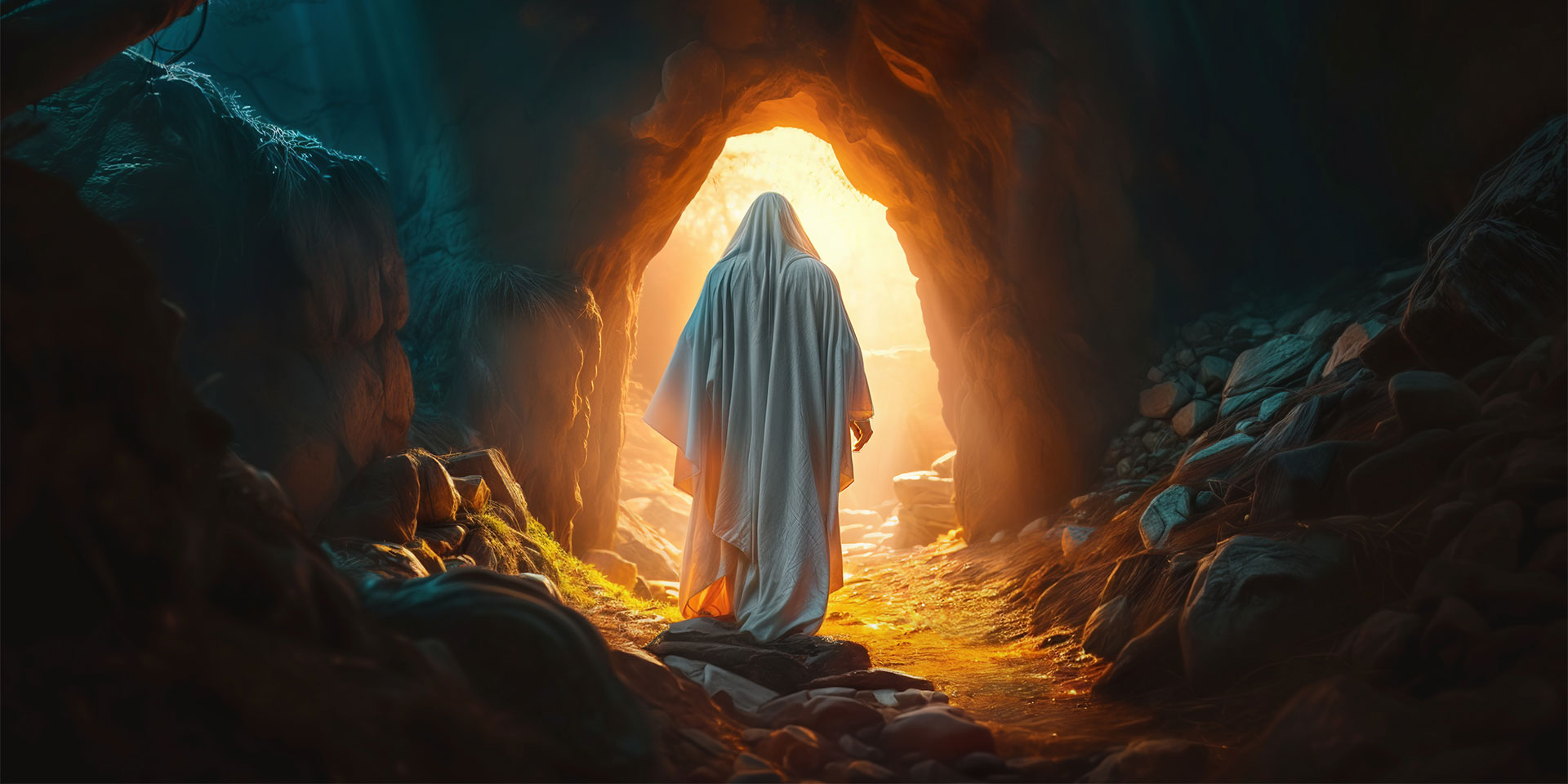Was the death of Jesus the end of an extraordinary life, or just the beginning of eternal life for those who believe in Him?
As I wander the paths of the cemetery, so many thoughts run through my mind. I think of unfinished conversations, unasked questions, or unfulfilled hugs. I count the years, I recompose the threads of the rich stream of life, I wipe the dust from faces and gestures that are fading. I think of all the tears that have flowed here beneath the uncaring willows, of all the words of life and death that I have heard rolling on the edge of the grave, of all the longing in which the hearts of those left behind have been wrapped.
Whenever my footsteps take me to the little cemetery at the top of the hill, with its rain-washed benches and willow trees spreading their green arms to the wooden and stone crosses (and, more recently, to sepulchres), that deep, unmuffled silence presses down on me, but it rings louder than any speech. The area in which familiar and unfamiliar people are buried has grown larger and larger, and as I measure with my eyes the space left free, I think of the heartbreaking emptiness that each departure digs into one’s heart.
I remember my grandfather, who now sleeps in the shadow of a cross. He was so full of life that December when we left for Spain, where wedding bells were ringing, without thinking for a moment that we would not find him when we returned. There seemed to be something different about him—although, from the vantage point of the second decade of one’s life, it is rare to see or suspect the changes that a life in its third quarter of a century quietly undergoes. He seemed as robust as ever, at least if you measured things by the countryman’s measure: the strength to do the work in the field and around the house. But he had a more tired look about him and sometimes said, when it came to future projects, that he would leave them to us. And that it was time for him to go to sleep—and when he said that he pointed to the cemetery nestled in the hillside where he had buried grandmother years before.
I don’t know how he knew, but he was right; one day he felt weaker, so the next two or three he rested more, but only after he had finished his chores in the yard. Then came the day he had always been accustomed to go to church. As he had never missed it, he put on his good clothes and walked quietly along the familiar road. But the weariness of which he had spoken had drained his strength, so he turned back from the road and lay down in bed like a man weary of all he had experienced. And that night, his sleep, full of a tiredness and a pain I did not comprehend, slipped into another sleep from which only the One could awaken him.
In the many-headed ball of thoughts that swarms over me in a cemetery where so many of my own rest, whether I knew them or not—and which may still consume lives without which I do not know how to imagine my future—this is the brightest of all: there is One at whose voice the graves will open powerlessly to release their prisoners forever. Just as His tomb opened.
Did the resurrection of Jesus really happen?
Some events have a powerful impact that changes the destiny of a generation (like the Great Depression of 1929-1933 or the two World Wars), but the resurrection of Jesus changes the whole course of human history, writes Pastor Paul Carter. In an article exploring the significance of the resurrection, Pastor Carter notes that discussions on the subject revolve around two main questions: Did the resurrection really take place? And what does it mean for humanity?
One of the characters Alice encounters in Wonderland is the White Queen, who argues that believing in the impossible is simply a matter of practice. As a child, for example, she managed to believe in up to six impossible things before breakfast. Based on this conversation, Christian author Glen Scrivener notes that Christians are often seen by those around them as a kind of White Queen—as people who occasionally suspend their reason to believe in fantastic things like the resurrection of the dead.
One of the reasons for believing this has to do with our very existence, says Scrivener: “We all live inside a glorious absurdity called existence. Here we are. We needn’t be. But out of nothing, everything. Out of the void, life.”
We live in a universe whose properties are finely tuned to support life, and if we have any idea how minuscule the chances of such fine-tuning were, why shouldn’t we believe in a God of resurrection?
History also helps us to believe in resurrection, Scrivener points out. Although He was born and lived in humble circumstances, Jesus of Nazareth claimed to be the Messiah, the Son of God. Crucified by the Romans after the Jews accused Him of blasphemy, Jesus was laid to rest, but on the third day His tomb was empty. His disciples saw Him after His resurrection, and during the 40 days before His ascension many others testified that He was alive. His body was not found, and His followers claimed that He had risen, even when they were punished with death for their testimony.
If you find it hard to believe these things and look for other, more reasonable explanations (Jesus did not die, the disciples stole His body and then claimed that He had risen), you are only moving forward in a tangle of even more absurd ideas, Scrivener concludes, recalling that instead of dying and being buried with Jesus on Good Friday, Christianity is alive, as is He.
Do Christians believe in the resurrection because of the evidence or in spite of it?
In an intriguingly titled article (“I Believe in the Death of Julius Caesar and the Resurrection of Jesus Christ”), Pastor Steve Bateman attempts to answer a provocative question: Do Christians believe in the resurrection because of the evidence or in spite of it?
Many people believe that the assassination of Roman dictator Julius Caesar really happened (in 44 BC) because they read Shakespeare’s tragedy in 1599. Shakespeare, in turn, was inspired by Plutarch’s Parallel Lives, translated by Thomas North in 1579. Plutarch did not speak to eyewitnesses of the assassination, but he had access to documents and oral testimony because he was a respected member of his society. Therefore, says Bateman, the interval between Julius Caesar’s assassination and Plutarch’s account is about 160 years. The New Testament authors wrote about the resurrection of Jesus during the lifetime of eyewitnesses who could confirm (or deny) that Jesus had risen and appeared to many. The interval between the resurrection and the earliest manuscript mentioning it is less than 20 years (Jesus died in 33 A.D. and the Apostle Paul writes of His resurrection in 50 A.D.—Galatians 1:1).
But since we lack the original manuscripts of the New Testament, as well as Plutarch’s original manuscript, a second interval becomes crucial for us, that between the original manuscript and the manuscripts that exist today, Bateman notes. Again, the Bible is far better at this—the interval between the original manuscript of the Gospel of John and a fragment of his Gospel is 50 years, while in the case of Plutarch the interval between the original manuscript and the oldest surviving manuscript of Parallel Lives is more than 800 years.
The stakes of the resurrection of Jesus
“The resurrection of Christ is the rock on which the Christian church is built,” says Pastor Kenneth Blanton. The book of Revelation calls Jesus “the firstborn from the dead” (Revelation 1:5), but “firstborn” or “first” does not refer to time, but to importance, Blanton explains. His resurrection is “first” because anyone who is resurrected before or after His resurrection owes their life to that resurrection. And if without the cross there could be no resurrection, “without the resurrection the cross would be a bleak monument of death and despair.”
More than the One who proved that there is a resurrection, Jesus is the guarantee that death is not our final destination and that in His presence we can have life in abundance, a life that lasts forever.
“For if the dead are not raised, then Christ has not been raised either. And if Christ has not been raised, your faith is futile; you are still in your sins. Then those also who have fallen asleep in Christ are lost… But Christ has indeed been raised from the dead, the firstfruits of those who have fallen asleep” (1 Corinthians 15:16-20).
Theology professor W.G.C. Murdoch wrote more than 60 years ago that the miracle of the Resurrection gave birth to the Church; it was not the Church that invented a myth to help it gain momentum. The success of the early Church is to be found here, rather than in the form of its organisation, the purity of its doctrine or the enthusiasm of its followers: in the fact that His followers became aware of the power and significance of the resurrection of the One whom they had seen with their own eyes (themselves or so many other witnesses) and who now sat on the throne of the Eternal One, uniting them with Him in a bond that not even death could break.
All the hope of a dying world comes only from the truth that Jesus is risen—this is one of the essential points of the Apostle Paul’s preaching: “If there is no resurrection of the dead, then not even Christ has been raised. And if Christ has not been raised, our preaching is useless and so is your faith… For if the dead are not raised, then Christ has not been raised either. And if Christ has not been raised, your faith is futile; you are still in your sins. Then those also who have fallen asleep in Christ are lost. If only for this life we have hope in Christ, we are of all people most to be pitied. But Christ has indeed been raised from the dead, the firstfruits of those who have fallen asleep” (1 Corinthians 15:13-14; 1 Corinthians 15:16-20).
The message we need to take to the world is not to prepare for death, Murdoch concludes, but to prepare for eternal life, and the assurance of eternal life comes from the fact that Jesus is risen and alive forever and ever. And if He was “the firstfruits of those who have fallen asleep” (1 Corinthians 15:20), then His resurrection and ours are “the beginning and the end of one, single harvest.” That is the best news we can receive here in the land of clay and (still) unmarked graves.
Carmen Lăiu is an editor of Signs of the Times Romania and ST Network.



















